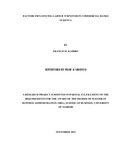| dc.contributor.author | Kahiro, Francis M | |
| dc.date.accessioned | 2016-04-25T08:53:30Z | |
| dc.date.available | 2016-04-25T08:53:30Z | |
| dc.date.issued | 2015 | |
| dc.identifier.uri | http://hdl.handle.net/11295/94983 | |
| dc.description.abstract | The project report covered factors influencing high staff turnover in commercial banks in Kenya; a case of CBK .Research objectives were to establish factors influencing labour turnover in commercial banks in Kenya. Descriptive research design was used with a sample size of 44 derived from a target population of 44. Functional departments were the strata and simple random method applied to distribute the questionnaires. Split-half reliability test was used to estimate reliability and content validity tested through expert’s opinion and referencing on past questionnaires. Interview Guide and desktop information provided key information used in summarizing the conclusions. Data collected was exported to SPSS version 20 for editing, coding to facilitate informative and relevant computation. The study found out that during the time of study most of the respondents agreed that training provided by commercial banks to prevent labour turnover degree. The study also found out that the respondents strongly agreed that organization provides opportunities for employees to progress in development of their careers and this prevents them from quitting. In addition, the study found out that the respondents receive or ever received increased basic pay from their respective banks as a form of rewarding them. The study also found out that that the respondents valued the rewards that they got. The study further found out that indicated that the rewarding system affected the employee turnover. The study found out that organization offer monetary rewards to employees whose performance is high to reduce the number of employees who quit the organization. The study concluded that the relationship between the employer and the employee in the bank has kept rate of labour turnover at low level. The study also found out that the rewarding system affected the employee turnover. The findings show that, the employer rules and regulations affect labour turnover. The study further found out that open communication in the organization has enhanced employee relations, which has reduced rate of labour turnover. The study concluded that the commercial banks staffs receive increased basic pay from their respective banks as a form of rewarding them which they highly value. The study also concluded that organizations offer monetary rewards to employees whose performance is high to reduce the number of employees who quit the organization. The study recommended that the banking and financial sector should increase intrinsic factors by initiation proper working environment such that there exists job satisfaction, ability to achieve targets and exercise control during execution of duties. These will increase intrinsic factors and reduce staff turnover. The study also recommended that the banks’ retention policies and strategies should adequately respond to the employees needs and other necessary implementations after market intelligence should be encouraged so that employees are motivated to facilitate their effectiveness and retention. | en_US |
| dc.language.iso | en | en_US |
| dc.publisher | University of Nairobi | en_US |
| dc.rights | CC0 1.0 Universal | * |
| dc.rights.uri | http://creativecommons.org/publicdomain/zero/1.0/ | * |
| dc.subject | labour turnover, banks, CBK | en_US |
| dc.title | Factors Influencing Labour Turnover in Commercial Banks in Kenya | en_US |
| dc.type | Thesis | en_US |



